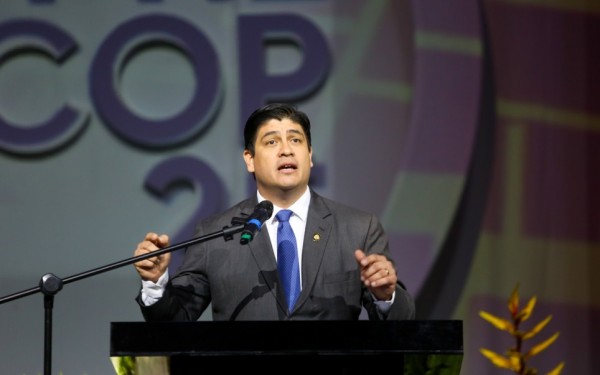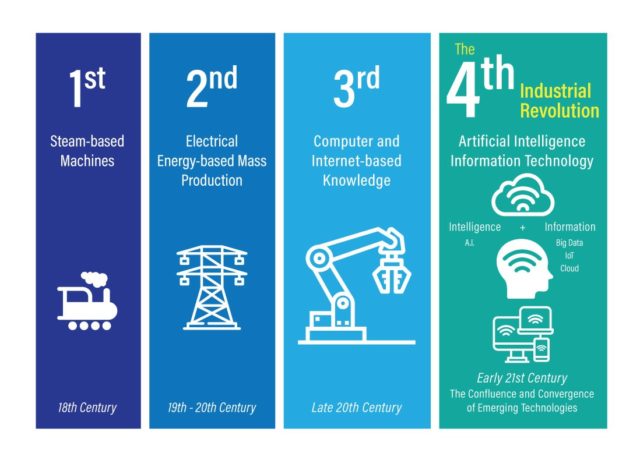In a message that went from the emotional to the energetic, President Carlos Alvarado marked this moment: “It is time to move from words to deeds, with a sense of urgency and transcendence. That is the message that we must send to the international community as a result of this meeting, and to COP25 organized by our Chilean brothers”, to be held next December.
Alvarado announced his decree of the moratorium on oil exploration and exploitation until 2050 and added that “we have also asked the congress to prohibit the exploitation of oil by law to send that message with greater force” to the world. “The climate crisis is the biggest challenge that we will face this and the next generations”.
Alvarado told the PreCOP25 participants that it is thanks to the “commitment, to his conviction, to his overwhelming response to this call, as well as to the support of millions of people across the planet” that solutions will be possible. ”And that is why, on behalf of the entire Costa Rican population, I want to thank you for being here”, he added.

The president evoked the agricultural origins of Costa Rican society to explain the vocation of protection of the nature of his people. “I want to call your attention to a simple object, but central to our welcome message and especially in our origins as a people. Humble and simple as it is, this is not only a bag with coffee that we give you as a way to make our gratitude tangible, but it represents a key to the essence of our people, which has been intertwined with the milestones of our society over the almost 200 years of independent life”.
Coffee was “the first product that linked us to international markets and the object of public policies to protect small producers that abound in our coffee activity, as well as to regulate relations between all the actors in their value chain. Environmentally, that pioneering attitude has not been left behind”, he said.
Costa Rica’s NAMA coffee
He recalled that 3 decades ago the traditional way of processing coffee had an intensive consumption of water and polluted the rivers. “From small producer cooperatives to large processing companies they adopted new methods to recirculate water, thus reducing their total consumption; then treat the water used in the process, to reduce its impact on the rivers; and separate the pulp to treat it and convert it into organic fertilizer, which allowed to improve the soils, decrease the consumption of agrochemicals and increase the yield of the crop. Now, its cultivation is also done by agroforestry systems”.
“Today we are honored to say that the first agricultural NAMA in the world was the NAMA coffee of Costa Rica. These nationally implemented mitigation actions are the result of the joint work of the private producer sector, public institutions, and international cooperation. Today we can say that more than 1/5 of our coffee is produced sustainably and is low in greenhouse gas emissions”.
The President’s emphasis continued by stating that “current consumers, but especially future ones” will demand these conditions from market products to reduce emissions, a factor that is “correct from an ethical point of view” and will add value “in a competitive world that will demand it”.
Environmental and peace commitment
Our country has “a great environmental ambition. As we have done with the NAMA coffee, we have also managed to reverse deforestation and increase our forest cover to the current 52%, and we have managed to generate clean and renewable energy in more than 98% of our electricity matrix. The foregoing was also accompanied by the abolition of the armed forces 70 years ago, a pillar and a message of peace”, said the president.
He recalled that these reasons prompted the government to propose Costa Rica as a laboratory country for decarbonization, in 2015, as part of the Paris Agreement.
Axes of the decarbonization plan
He added that the National Decarbonization Plan 2018-2050 was presented in February of the current year, with ambitious goals in 10 axes, which include public, private and freight transport; sustainable and clean production in industry; smart cities; digitalization; waste management; agriculture, livestock, and forest resources.
He pointed out where the obstacles are: Now, skepticism, questions or valid doubts are focused on the cost / benefit of action against climate change and economic growth”.
Driven by the decision “to become a laboratory for decarbonization, we decided to demonstrate the cost / benefit of our Plan, through a rigorous academic exercise in which the University of Costa Rica, the IDB, the Rand Corporation, the Real have collaborated Institute of Technology of Stockholm, Sweden, and the Tecnológico de Monterrey, Mexico”.
As a scoop, he said, that by measuring the first 3 axes of the Plan until 2050 -related to public transport, private transport and freight transport- “the researchers’ findings suggest that the country will obtain a net benefit of US $ 19.5 billion when making the changes indicated there”.
This is because we should make investments for almost US$ 6,000 million by 2050, including those related to electrical infrastructure to enable transport electrification. That investment would allow us to earn US$ 11.1 billion as a result of lower operating costs, he added.
There is a first direct profit, for US $ 5.2 billion net by 2050. To this we must add benefits in terms of health, greater productivity due to less road congestion and avoided accidents, which represent a total of US$ 14,300 million by 2050, according to the projections of the experts.
“These data reflect that the decarbonization laboratory called Costa Rica can prove that the ambitious objectives of decarbonization are attainable without harming development, sustainable, human and economic”, pointed out the president.
Moratorium and ban on oil exploitation
President Alvarado announced that “with confidence in these data, we have not only decreed the moratorium on oil exploration and exploitation by 2050, but we have asked the congress to prohibit the exploitation of oil by law to send that message with greater force.”
Our greatest ambition, he said, “is to implement innovative policies in the hands of inclusive policies in various fields, from a healthy environment, job creation, equality between men and women, non-discrimination of any kind and digital inclusion in the era of the 4th Industrial Revolution”.

“Peace, sustainability, respect for human rights, innovation, high environmental ambition, but above all empathy and friendship: that we want to offer today synthesized in a coffee bag, which we wish you can take with the people you love, so that you Share a message of courage and hope about the present and the future. That is our dream and the invitation that Costa Ricans make to the entire international community.
We invite you these days to get out of the ordinary, of the conventional, and translate our greatest ambitions into concrete actions to face the challenge of the climate crisis. Thank you very much and very appropriately said on this occasion: Pura Vida!”, concluded the president.

